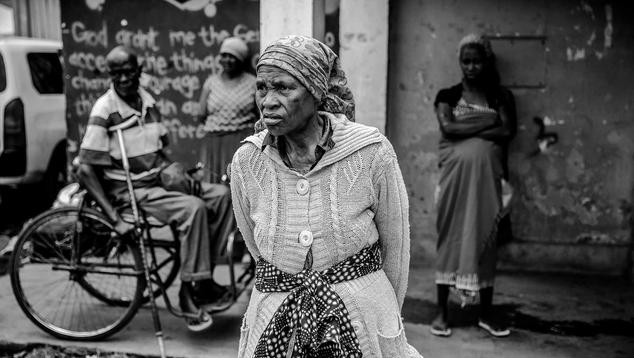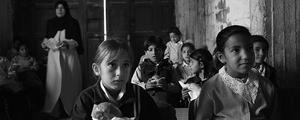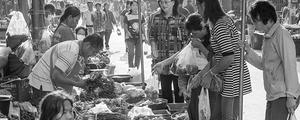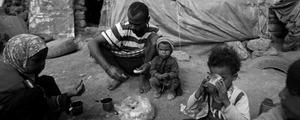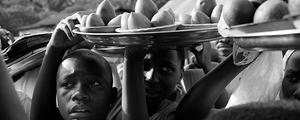Unless swift action is taken, the COVID-19 pandemic could push an estimated 265 million people into acute food insecurity in 2020, according to World Food Programme projections. Millions and millions of these people will be women. And according to a new, globally applicable measure developed by the World Food Programme and Gallup, women are likely to be affected differently than men during the crisis.
By combining questions from the FAO's Food Insecurity Experience Scale with 25 questions across five dimensions of gender inequality, the new Gender Equality for Food Security (GE4FS) measure bridges the gender data gap in food security at an extremely critical time.
The GE4FS data, collected across 17 countries between 2018 and 2019, yield important insights into how the world needs to respond to the particular needs of women, who were already more likely to be food insecure than men before COVID-19 disrupted the world's food systems.
Financial Self-Sufficiency: Women Had Fewer Financial Resources Before COVID-19
Financial self-sufficiency is key to women's empowerment and provides a buffer against food insecurity. Women who have their own income and assets have greater financial autonomy and input in household decision making.
The study asked about four aspects of financial self-sufficiency: 1) having income to use without asking permission within the last 12 months, 2) having an account with a bank or another financial institution, 3) having money saved to use if needed and 4) having mobile phones.
In the majority of the GE4FS surveyed countries, women were less likely than men to have income they could use without permission, less likely to have money saved that they could use if they needed it, and less able to make their own decisions about what to do with that money.
In terms of countries surveyed, the largest gender gap when it comes to having income to use without seeking permission was in Egypt, followed by Venezuela. When it comes to bank accounts, the largest gender gap was in Kenya. Venezuela and Sri Lanka were the only countries with gender gaps reversed, where women are more likely than men to have bank accounts.
There were also important gender gaps in mobile phone ownership in most of the countries surveyed, the largest of which was in Tajikistan. There were also sizable gaps in Egypt, Mozambique and Liberia, with men more likely than women to report owning one.
Decision-Making: Women More Likely to Be Prevented From Making Healthcare Choices
The GE4FS measures people's ability to make decisions in five areas, 1) seeking medical or healthcare services, 2) spending time with relatives, 3) working for pay outside the home, 4) going to the market or shops on their own, and 5) owning property, such as land, home or other dwellings.
Ahead of the pandemic, but very crucial as the world responds and recovers from it, the GE4FS data indicate that women are less likely than men to be able to make their own decisions about seeking medical services.
Across the majority of the countries surveyed, women were less likely than men to make their own decisions about a range of issues. In Egypt, the gender gaps in terms of decision-making ability were the largest across all countries included in this study. In Venezuela, Nicaragua and Lesotho, the gender gaps were the smallest across all of these questions.
Labor: Unpaid Work Likely to Increase for Women
Women already spend a lot more time than men doing unpaid care and domestic work, and this time only increases in healthcare crises such as COVID-19, when women are taking on more because of discriminatory gender norms, job losses, school closures and people falling ill.
Three in four of the women surveyed for the GE4FS said that they are the person in their household who spends the most time doing housework, compared with about one in four men.
Women in all countries studied were far more likely than their male counterparts to say that they spend the most time doing housework, with at least two-thirds of women in every country saying so. Even in countries with relatively small gender gaps on most questions, such as Venezuela and Lesotho, or Cambodia where the gender gap on some questions was reversed, women were more than twice as likely as men to say they did most of the housework.
Reproductive Freedom: Women's Choices May Be More Limited
Control over sexual and reproductive health is an integral component of gender equality and contributes to food security around the globe. A key component of control over sexual and reproductive health is access to contraception. During health emergencies, women's access to sexual and reproductive health services is even more limited, which may lead to unwanted pregnancies and reduced pre- and post-natal care.
Women in the GE4FS study were less likely than men to be able to decide for themselves on the methods to prevent pregnancy or sexually transmitted diseases.
Women in Bangladesh, Sri Lanka, Kyrgyzstan, Kenya and Mozambique were much less likely than men to report that they could decide on their own whether to use any methods to prevent pregnancy or sexually transmitted illnesses. Cambodia was the only country in the study with a reversed gender gap on this question, with men less likely than women to respond affirmatively.
Implications
The GE4FS data are important because they help close the gender gap in what the world knows about food security, and they couldn't have arrived at a more critical time than now. The data make it clear that relevant responses to COVID-19 require collecting sex- and age-disaggregated data; tailoring, targeting and reaching women and men with information and assistance; involving women and men in all stages of a response and at all levels; monitoring response impacts on women and men; and addressing gender-based violence.
For more information about this study, read the full report.
Jacqueline Paul, the World Food Programme lead for Gender Equality for Food Security, collaborated on this article.
